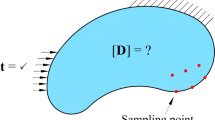Abstract
The solution of the inverse problem of technological physics is considered as a problem of the optimal control of an object with distributed parameters based on the Pontryagin maximum principle for an infinite-dimensional object formulated as necessary optimality conditions. The inverse problem of heat conduction is formulated in the uniform metric of estimation of the error in the description of the state function of the studied object and is reduced to the problem of the optimal control of an infinite-dimensional object with an integral quality functional and an extended state vector, for which the nature of the optimal control action is established with the Pontryagin maximum principle. The maximum principle method, which takes into account the relations that ensure that the solution belongs to a given compact set, makes it possible to obtain a parametric representation of the identified lumped or spatially distributed characteristics.





Similar content being viewed by others
REFERENCES
Butkovskii, A.G., Teoriya optimal’nogo upravleniya sistemami s raspredelennymi parametrami (The Theory of Optimal Control of Systems with Distributed Parameters), Moscow: Nauka, 1965.
Butkovskii, A.G., Metody upravleniya sistemami s raspredelennymi parametrami (Methods for Controlling Systems with Distributed Parameters), Moscow: Nauka, 1975.
Butkovskii, A.G., Malyi, S.A., and Andreev, Yu.N., Optimal’noe upravlenie nagrevom metalla (Optimal Control of Metal Heating), Moscow: Metallurgiya, 1972.
Egorov, Yu.V., Mat. Sb., 1964, vol. 64(106), no. 1, p. 709.
Panasyuk, V.I., Kovalevskii, V.B., and Polityko, E.D., Optimal’noe upravlenie v tekhnicheskikh sistemakh (Optimal Control in Technical Systems), Minsk: Nauka Tekhnika, 1990.
Fel’dbaum, A.A. and Butkovskii, A.G., Metody teorii avtomaticheskogo upravleniya (Methods of the Theory of Automatic Control), Moscow: Nauka, 1971.
Pontryagin, L.S., Boltyanskii, V.G., Gamkrelidze, R.V., and Mishchenko, E.F., Matematicheskaya teoriya optimal’nykh protsessov (Mathematical Theory of Optimal Processes), Moscow: Nauka, 1983.
Rapoport, E.Ya., Optimizatsiya protsessov induktsionnogo nagreva metalla (Optimization of Processes of Induction Heating of Metal), Moscow: Metallurgiya, 1993.
Rapoport, E.Ya., Optimal’noe upravlenie sistemami s raspredelennymi parametrami (Optimal Control of Distributed Parameter Systems), Moscow: Vysshaya Shkola, 2009.
Rapoport, E.Ya., Al’ternansnyi metod v prikladnykh zadachakh optimizatsii (Alternance Method in Applied Optimization Problems), Moscow: Nauka, 2000.
Rapoport, E.Ya. and Pleshivtseva, Yu.E., Optimal’noe upravlenie temperaturnymi rezhimami induktsionnogo nagreva (Optimal Temperature Control of Induction Heating), Moscow: Nauka, 2012.
Alifanov, O.M., Identifikatsiya protsessov teploobmena letatel’nykh apparatov (Identification of Heat Transfer Processes in Aircraft), Moscow: Mashinostroenie, 1979.
Tikhonov, A.N., Dokl. Akad. Nauk SSSR, 1943, vol. 39, no. 5, p. 195.
Diligenskaya, A.N. and Rapoport, E.Ya., J. Eng. Phys. Thermophys., 2014, vol. 87, no. 5, p. 1126.
Diligenskaya, A.N. and Rapoport, E.Ya., J. Eng. Phys. Thermophys., 2016, vol. 89, no. 4, p. 1008.
Diligenskaya, A.N., High Temp., 2018, vol. 56, no. 3, p. 382.
Rapoport, E.Ya., Strukturnoe modelirovanie ob”ektov i sistem upravleniya s raspredelennymi parametrami (Structural Modeling of Objects and Control Systems with Distributed Parameters), Moscow: Vysshaya Shkola, 2003.
Pervozvanskii, A.A., Kurs teorii avtomaticheskogo upravleniya (Automatic Control Theory), St. Petersburg: Lan’, 2015.
Tsirlin, A.M., Balakirev, V.S., and Dudnikov, E.G., Variatsionnye metody optimizatsii upravlyaemykh ob”ektov (Variational Methods of Optimization of Controlled Objects), Moscow: Energiya, 1976.
Ivanov, V.A. and Faldin, N.V., Teoriya optimal’nykh sistem avtomaticheskogo upravleniya (Theory of Optimal Automatic Control Systems), Moscow: Nauka, 1981.
Egorov, Yu.V., in Matematika na sluzhbe inzhenera. Osnovy teorii optimal’nogo upravleniya (Mathematics at the Service of an Engineer: Fundamentals of the Theory of Optimal Control), Moscow: Znanie, 1973, p. 187.
Rapoport, E.Ya. and Pleshivtseva, Yu.E., Izv. Ross. Akad. Nauk, Energ., 2002, no. 5, p. 144.
Funding
This work was carried out with financial support from the Ministry of Education and Science of the Russian Federation within the framework of the design part of state assignment no. 0778-2020-0005.
Author information
Authors and Affiliations
Corresponding author
Rights and permissions
About this article
Cite this article
Diligenskaya, A.N., Rapoport, E.Y. Analytical Conditions for Optimality in Inverse Problems of Heat Conduction. High Temp 59, 292–301 (2021). https://doi.org/10.1134/S0018151X21030032
Received:
Revised:
Accepted:
Published:
Issue Date:
DOI: https://doi.org/10.1134/S0018151X21030032




